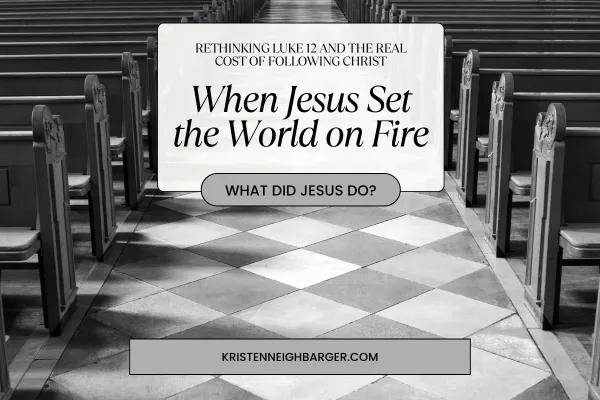
When Jesus Set the World on Fire Rethinking Luke 12 and the Real Cost of Following Christ
I was in high school when “See You at the Pole” started.
This was peak legalistic-Kristen era, and I was all in. We had a 20-minute prayer meeting around the flagpole at my tiny country high school, and I treated it like the Super Bowl of spiritual performances.
We had scripts. We had prayers. We had tacky Christian t-shirts and dusted-off WWJD bracelets. And of course, we had hopes that our very public display of faith would save all the souls watching us from inside the building.
Fast forward a few years, and I’m away at Christian college when the Columbine shooting happened. In its aftermath, a movement swept across youth groups and college campuses. Christian students were asked, “If someone pointed a gun at you and asked if you were a Christian, would you say yes?”
Books were written. T-shirts and bracelets were sold. And suddenly, a national tragedy was transformed into a marketing machine aimed at making bold faith a moment of spectacle instead of a lifestyle of surrender.
Looking back, I now see the common thread in both of those movements: a hyper-focus on public, high-pressure declarations of faith instead of faithful, quiet allegiance to Christ in the boring, everyday moments of life.
And honestly?
If you’re living like Jesus in your actual, regular life, no one should be shocked to find out you’re a Christian.

The Fire Jesus Really Brought (Luke 12:49–59)
In this post, we’ll explore the meaning of Luke 12:49–59 and why Jesus' words about fire and division are some of the most misunderstood verses in the Bible. When read in historical context, these verses aren’t about hostility—they’re about the radical disruption Jesus brought to political and religious systems. This brings us to a passage that’s been misunderstood, misquoted, and misused:
“I have come to set the earth on fire... Do you think I came to bring peace on earth? No, I tell you, but division.” —Luke 12:49–51
I’ve heard this text weaponized more times than I can count—used to justify:
Harsh judgment
In-fighting between believers
Bullying people who think differently
Justifying estrangement from family members
Promoting a gospel of division instead of peace
But that’s not what Jesus was doing here.
Historical & Political Context We Forget
To understand this passage, we have to remember who Jesus was talking to—and what they expected from a Messiah. First-century Jews weren’t longing for a personal spiritual savior. They were waiting for a revolutionary king who would overthrow Rome and restore Israel.
So when Jesus talked about fire, they heard it as judgment and purification. They were hoping that fire would fall on their enemies. But Jesus’ fire wasn’t aimed at Rome. It was aimed at them—at the religious systems that had grown corrupt and the cultural obsessions with power and exclusion.
When He spoke of division, He wasn’t prescribing it. He was describing the very real cost of following Him.
Choosing Jesus meant:
Alienation from your community
Risking your reputation or livelihood
Defying deeply entrenched religious power structures
It wasn’t about getting disinvited from Thanksgiving. It was about risking everything.
Not an Excuse for Division
Too often, people take this passage and use it as a green light to cut off relationships or treat others harshly in the name of Jesus. But Jesus wasn’t saying, “Go out and divide your families.” He was saying, “Following me is going to cost you something—and yes, that may include relationships.”
It’s a warning, not a weapon.
Then, Jesus shifts from warning to invitation:
“You know how to interpret the weather. But you don’t understand what’s happening right in front of you.”
“Why not judge for yourselves what is right?”
Translation? Wake up. Stop missing the kingdom of God breaking into your midst. Stop waiting for external victory when inward transformation is standing in front of you.

Then vs. Now
This message wasn’t just about ancient Jerusalem. It has a powerful echo for us today.
When we look at modern Christianity, it’s easy to see a lot of spectacle and noise. Flagpole prayers. Public declarations. Culture wars.
But are we willing to let Jesus disrupt:
Our obsession with power?
Our comfort with injustice?
Our tendency to gatekeep who “belongs” in God’s kingdom?
Reflection Questions
When have I prioritized public faith displays over quiet, everyday faithfulness?
In what ways have I seen this passage used to hurt or divide?
What systems—religious, political, cultural—would Jesus be disrupting today?
Where have I missed the work of God happening right in front of me?
How can I embody allegiance to Christ in my ordinary, unseen moments?
Call to Action: Be the Disruption
This week, don’t wait for a moment around a flagpole or a dramatic declaration to prove your faith. Let how you live every single day be the evidence.
Look for what God might be disrupting in your own heart, your community, or your church.
Let your love disrupt injustice.
Let your grace disrupt religiosity.
Let your peace disrupt hostility.
Don’t just wear the bracelet. Walk the way.
🌿 Looking for fresh inspiration and real connection with fellow writers?
The Hope Story Conference is happening January 29–31, 2026 in Charlotte, North Carolina, and it’s one of my favorite spaces for writers who want to grow in both craft and calling. With keynote speakers like Ruth Chou Simons and Ann Voskamp, you’ll leave refreshed, equipped, and reminded that your story truly matters.
It’s a weekend filled with practical workshops, meaningful community, and encouragement for every stage of the writing journey.
👉 Grab your ticket here: Hope Story Conference
(That’s my affiliate link—thank you for using it to support my work!)
